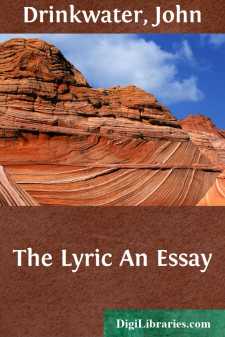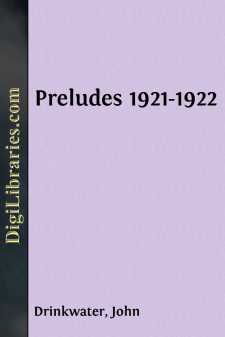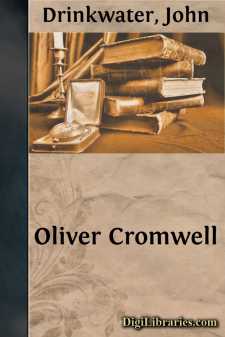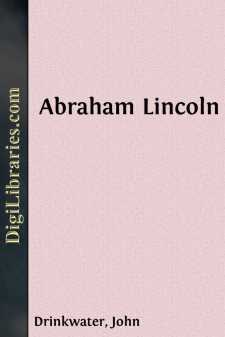Categories
- Antiques & Collectibles 13
- Architecture 36
- Art 48
- Bibles 22
- Biography & Autobiography 813
- Body, Mind & Spirit 142
- Business & Economics 28
- Children's Books 17
- Children's Fiction 14
- Computers 4
- Cooking 94
- Crafts & Hobbies 4
- Drama 346
- Education 46
- Family & Relationships 57
- Fiction 11829
- Games 19
- Gardening 17
- Health & Fitness 34
- History 1377
- House & Home 1
- Humor 147
- Juvenile Fiction 1873
- Juvenile Nonfiction 202
- Language Arts & Disciplines 88
- Law 16
- Literary Collections 686
- Literary Criticism 179
- Mathematics 13
- Medical 41
- Music 40
- Nature 179
- Non-Classifiable 1768
- Performing Arts 7
- Periodicals 1453
- Philosophy 64
- Photography 2
- Poetry 896
- Political Science 203
- Psychology 42
- Reference 154
- Religion 513
- Science 126
- Self-Help 84
- Social Science 81
- Sports & Recreation 34
- Study Aids 3
- Technology & Engineering 59
- Transportation 23
- Travel 463
- True Crime 29
The Lyric An Essay
by: John Drinkwater
Description:
Excerpt
WHAT IS POETRY?
If you were to ask twenty intelligent people, "What is the Thames?" the answer due to you from each would be—"a river." And yet this would hardly be matter to satisfy your enquiring mind. You would more probably say, "What do you know of the Thames?" or, "Describe the Thames to me." This would bring you a great variety of opinions, many dissertations on geological and national history, many words in praise of beauty, many personal confessions. Here would be the revelation of many minds approaching a great subject in as many manners, confirming and contradicting each other, making on the whole some impression of cumulative judgment, giving you many clues to what might be called the truth, no one of them by itself coming near to anything like full knowledge, and the final word would inevitably be left unsaid.
The question, "What is poetry?" has been answered innumerable times, often by the subtlest and clearest minds, and as many times has it been answered differently. The answer in itself now makes a large and distinguished literature to which, full as it is of keen intelligence and even of constructive vision, we can return with unstaling pleasure. The very poets themselves, it is true, lending their wits to the debate, have left the answer incomplete, as it must—not in the least unhappily—always remain. And yet, if we consider the matter for a moment, we find that all this wisdom, prospering from Sidney's Apology until to-day, does not strictly attempt to answer the question that is put. It does not tell us singly what poetry is, but it speculates upon the cause and effect of poetry. It enquires into the impulse that moves the poet to creation and describes, as far as individual limitations will allow, the way in which the poet's work impresses the world. When Wordsworth says "poetry is the breath and finer spirit of all knowledge," he is, exactly, in one intuitive word, telling us how poetry comes into being, directing us with an inspired gesture to its source, and not strictly telling us what it is; and so Shelley tells us in his fiery eloquence of the divine functions of poetry. But poetry is, in its naked being and apart from its cause and effect, a certain use of words, and, remembering this simple fact, there has been one perfect and final answer to the question, "What is poetry?" It was Coleridge's: "Poetry—the best words in the best order."
This is the fundamental thing to be remembered when considering the art of poetry as such. The whole question of what causes a poet to say this or that and of the impression that is thence made upon us can be definitely narrowed down to the question "How does he say it?" The manner of his utterance is, indeed, the sole evidence before us. To know anything of a poet but his poetry is, so far as the poetry is concerned, to know something that may be entertaining, even delightful, but is certainly inessential. The written word is everything. If it is an imperfect word, no external circumstance can heighten its value as poetry. We may at times, knowing of honourable and inspiriting things in a poet's life, read into his imperfect word a value that it does not possess. When we do this our judgment of poetry is inert; we are not getting pleasure from his work because it is poetry, but for quite other reasons. It may be a quite wholesome pleasure, but it is not the high æsthetic pleasure which the people who experience it generally believe to be the richest and most vivid of all pleasures because it is experienced by a mental state that is more eager and masterful than any other. Nor is our judgment acute when we praise a poet's work because it chimes with unexpected precision to some particular belief or experience of our own or because it directs us by suggestion to something dear to our personal affections. Again the poet is giving us delight, but not the delight of poetry. We have to consider this alone—the poet has something to say: does he say it in the best words in the best order? By that, and by that alone, is he to be judged.
For it is to be remembered that this achievement of the best words in the best order is, perhaps, the rarest to which man can reach, implying as it does a coincidence of unfettered imaginative ecstasy with superb mental poise. The poet's perfect expression is the token of a perfect experience; what he says in the best possible way he has felt in the best possible way, that is, completely. He has felt it with an imaginative urgency so great as to quicken his brain to this flawless ordering of the best words, and it is that ordering and that alone which communicates to us the ecstasy, and gives us the supreme delight of poetry. It should here be added that poetry habitually takes the form of verse. It is, perhaps, profitless to attempt any analysis of the emotional law that directs this choice, nor need it arbitrarily be said that poetry must of necessity be verse. But it is a fact, sufficiently founded on experience, that the intensity of vision that demands and achieves nothing less than the best words in the best order for its expression does instinctively select the definitely patterned rhythm of verse as being the most apt for its purpose. We find, then, that the condition of poetry as defined by Coleridge implies exactly what the trained judgment holds poetry to be....





